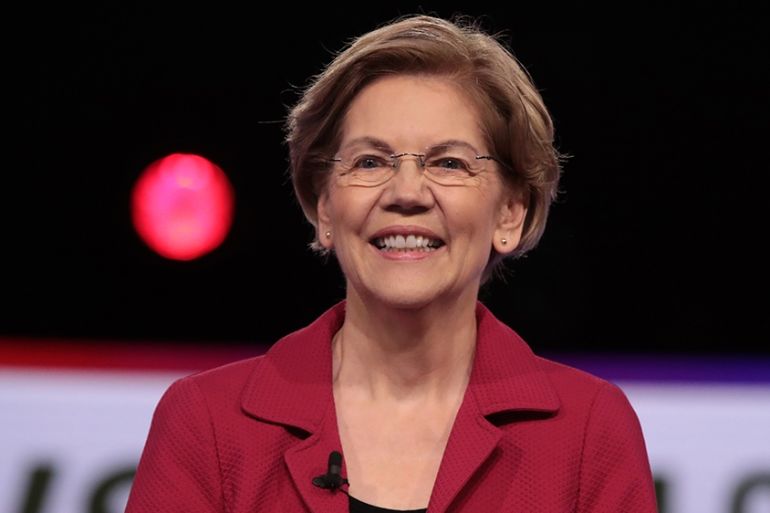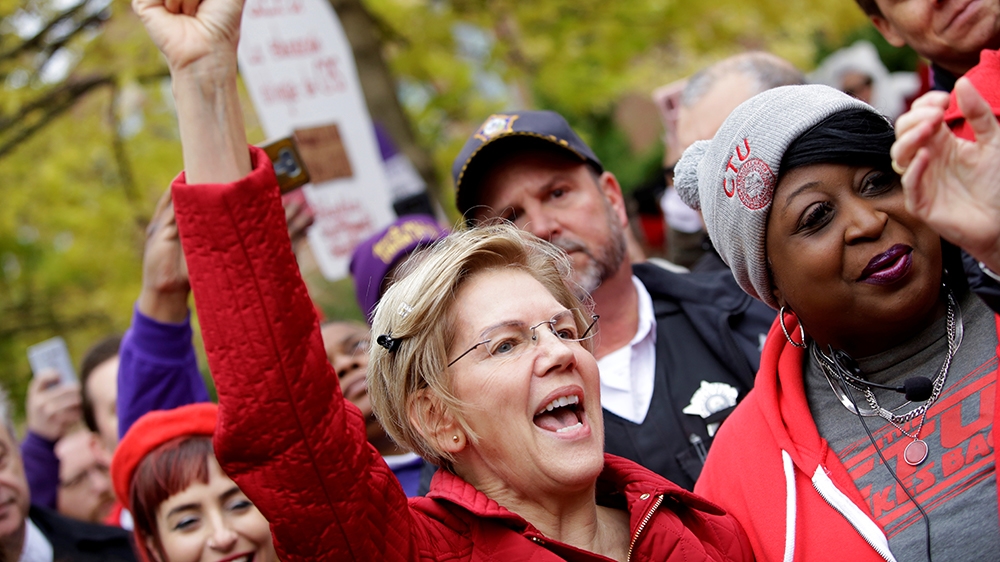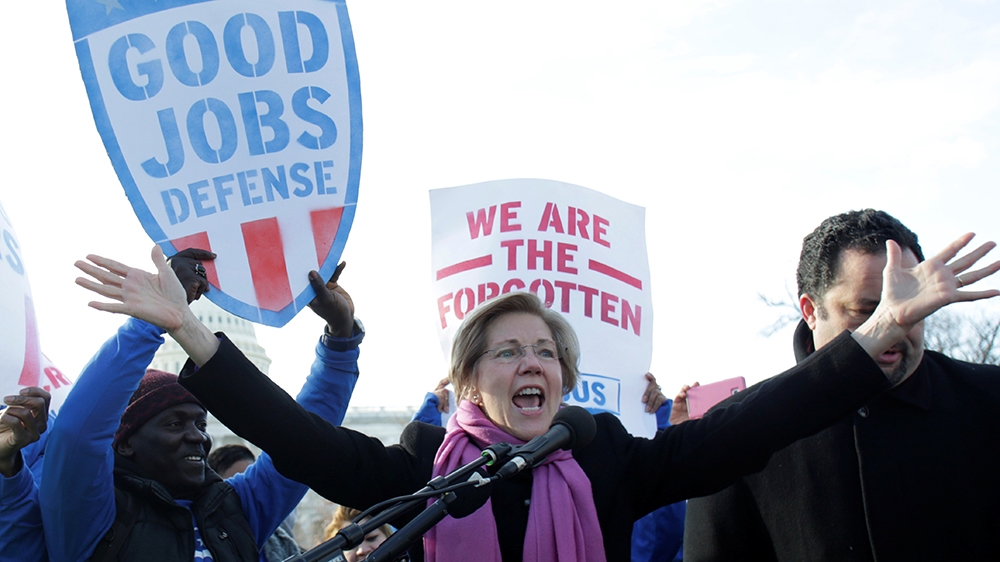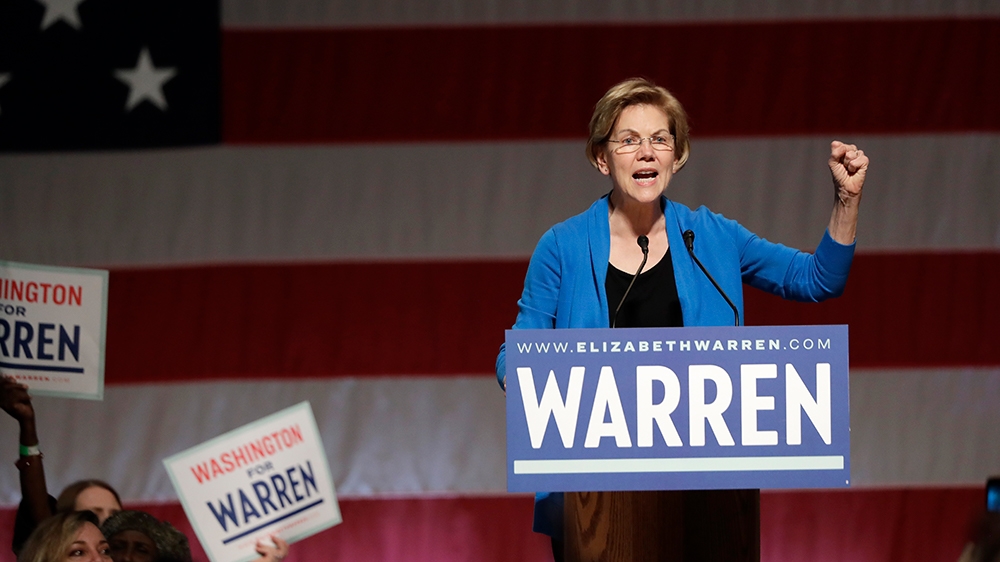Elizabeth Warren: Who is she, where does she stand on key issues?
The progressive presidential hopeful holds herself up as an economic reformer working to boost the US middle class.

Elizabeth Warren has held herself up as an economic reformer working to boost the United States middle class and run an unapologetically progressive campaign, while reportedly working to stay in the good graces of the Democratic Party’s establishment.
The senator from Massachusetts rose to national prominence following the 2008 financial crisis as a Harvard Law School bankruptcy expert chairing a congressional oversight panel charged with monitoring the government’s attempts to rescue financial institutions. She set up an independent financial consumer watchdog under President Barack Obama, but ran for Senate, and was elected in 2012, after she was not nominated to head the agency.
Keep reading
list of 3 itemsUS elections 2020: When are the debates, primaries, conventions?
US election 2020: What are presidential primaries and caucuses?
She now faces a narrowing field in what began as one of the US’s most crowded and diverse races for the Democratic nomination. National polls have Warren regularly placing among the top three candidates, along with fellow progressive Senator Bernie Sanders and centrist frontrunner former Vice President Joe Biden. Her showing, along with that of Sanders, implies that candidates once considered too far left are resonating with a growing number of liberals.
In February, standing at the site of a notorious 20th-century workers’ strike in Lawrence, Massachusetts, Warren officially announced her candidacy and promised a systemic overhaul if elected.
“It won’t be enough to just undo the terrible acts of this administration,” Warren, 70, said. “We can’t afford to just tinker around the edges – a tax credit here, a regulation there. Our fight is for big, structural change.”

Opponents say Warren’s left-wing policies will be ripe for attack in the general election, but she could also become the unique candidate able to bridge the divide between the Democratic Party’s activists and its more traditional centrists, said Basil Smikle, former executive director of New York State Democratic Party and a Columbia University lecturer.
“I think she has in many ways a lot of policies that Sanders raised in 2016, without inheriting any of his socialist labels,” said Smikle. “She went out of her way, according to news reports, to reach out to leaders of the Democratic Party across the country to essentially assuage their concerns about her and whether she would engage them and embrace them throughout the process.”
Warren’s poll numbers slumped as 2019 came to a close, a problem which some analysts blamed on the November rollout of her “Medicare for All” plan which alienated the party’s progressives and moderates alike.
Rebuilding the Middle Class
Warren was raised in Oklahoma. Her father worked as a janitor, salesman, and mechanic. Before getting into politics, she taught children with special needs at a public elementary school in Texas. She eventually got her law degree and taught at a number of law schools across the US.
In her telling, the economic uncertainty of those formative years lead to a fascination with the forces that shape the lives of working-class Americans.
The Warren campaign has largely focused on her history of combating what she describes as the “predatory” practices of big banks, Wall Street, lobbyists and student loan lending. Her platform to “rebuild the middle class” is defined by proposals that redistribute wealth, offer universal child care, student loan forgiveness, and give workers more power in the leadership of the corporations that employ them. She has said her plan for Medicare for All will not raise middle-class taxes “one penny” – a claim challenged by critics, including some economists.

Like Sanders, Warren has eschewed soliciting money from wealthy donors and has pledged to continue that policy into the general election, with some caveats. Warren took in nearly $25m in one three-month period, she announced in October, just slightly less than Sanders during that time. With the average donation at just $26, the gains served as proof positive of Warren’s formidable base.
In September, the Working Families Party, a national organisation with an extensive grassroots network of unions and community organisations, endorsed Warren. The group, which had resoundingly backed Sanders in 2016, faced backlash for the pivot.

“Progressives are really lucky to have two candidates in this race that speak to the values of our movement,” said Joe Dinkin, the national campaign director for the party. “We were one of the first national organisations that supported Bernie in 2015, and his 2016 primary, he’s had a tremendous effect on changing the public discourse in the country.”
But in Warren, he said, “you have the big ideas and the agenda and also the level of detailed governance and planning that gives us trust that she can enact and implement those things.”
Others have questioned Warren’s progressive credentials. In November, Nathan Robinson, editor of the progressive Current Affairs magazine, penned a piece for the UK’s Guardian newspaper headlined “Progressives trust your gut: Elizabeth Warren is not one of us”. Robinson argued that Warren, a Republican until 1996, had previously done legal work for big corporations, was not actually committed to Medicare for All and had never been “particularly progressive” on foreign policy.
Ultra-millionaire tax
One of Warren’s most brazen proposals, a signature of her campaign, is a wealth tax on the country’s richest citizens.
The tax would apply to households with a net worth of $50m or more, applying to roughly 75,000 of the wealthiest households in the country, according to University of California Berkeley economists Emmanuel Saez and Gabriel Zucman, whose research Warren’s plan cites. These households would pay a 2 percent tax on every dollar of net worth above that amount and a 6 percent tax on every dollar above a net worth of one billion dollars.
The campaign says this “small tax” would bring in roughly $3.75 trillion in revenue over 10 years.
Warren says the proposal “will help address runaway wealth concentration and at the same time accelerate badly needed investments in rebuilding our middle class”.
But critics have questioned the math.
“She’s got some good, reputable, highly capable economists who have advised her on the Wealth Tax,” said Jeffrey Frankel, an economist and professor at Harvard, “There are many others who disagree with their numbers.”
Medicare for All
One stumbling block for Warren, according to Brookings Institution senior fellow Elaine Kamarck, has been her healthcare plan.
In the first Democratic debate, Warren came out in favour of Sander’s signature Medicare for All platform, which would migrate US healthcare to a sole government-funded programme providing for all citizens.

In November, when Warren finally released her plan, she called for intermediate steps in that direction. The plan would initially create a government healthcare agency to compete with private insurers, which would later be replaced by the single-payer system.
The progression, initially signalling that she wanted to do away with private insurers completely, likely alienated centrists, Kamarck said. But when Warren later presented a more moderate plan, it came across as a cop-out to many progressives in the party.
“She really needed to have clarified her position on private insurance before she went out there,” said Kamarck. “She backtracked, and now nobody’s happy with her.”
Foreign policy
Warren’s foreign policy platform has been largely framed in the context of paying for domestic policy by ending the “endless” and costly US wars in Syria, Iraq and Afghanistan. She has criticised Trump for his hostility with Iran, calling the assassination of Iranian commander Qassem Soleimani “reckless” and previously saying the US should rejoin the 2015 nuclear deal if Tehran returns to compliance.
In an October video to J Street, a liberal Jewish Middle East policy group, Warren said: “We must find ways to make tangible progress on the ground toward a two-state solution” with Israel and the occupied Palestinian territories.
She added that this means “findings ways to apply pressure and create consequences for problematic behaviour” which would include the US making it “clear that none of our aid should be used to support annexation” of the West Bank.

Warren’s platform focuses on strengthening diplomacy, and includes doubling the size of the foreign services and opening posts in “underserved areas to broaden US presence”.
She also has promised to cut the “bloated” defence budget. Her proposed cut of 11 percent of the budget has attracted criticism from, among others, Brookings Institution senior fellow Thomas Wright, who wrote in the Atlantic that the cut would come with “acceptance of greater risk in key theatres, including in the counterterrorism fight in the Middle East”.
Climate Change
In her approach to the environment, Warren’s economic policies are again characteristically brazen, with a $3 trillion plan that envisions 100 percent clean energy in 10 years and industrial prosperity entwined within a hard pivot to green.
In suggesting the urgency of the moment, Warren’s plan invokes the 20th-century space race and the US-funded rebuilding of Europe following World War II, calling for a “Green Apollo Program” that would put $400bn into renewable energy research and development and a “Green Marshall Plan” that aims to export those US green innovations abroad.
Her plans aim to reduce emissions for US military operations, limit fossil-fuel extraction on public lands, and revitalise a greener manufacturing sector, while cracking down on gas and oil lobbying and subsidising the consumer transition to renewable energy.
Electability against Trump
Questions remain about how Warren, if chosen as the Democratic nominee, would fare against Trump in a general election, and if she would need to move her policies more to the centre to appeal to undecided voters in pivotal swing states.
Trump has already seized on – largely disproven – accusations that Warren had benefitted professionally from embellishing her Native American ancestry, in particular, during her time at the University of Pennsylvania and Harvard. The president often refers to the senator derisively as “Pocahontas”, while portraying the allegations as evidence of her dishonesty.

In the past, Trump has proven adept at making such negative branding stick. Meanwhile, Warren’s attempt to silence critics by releasing a DNA test fell flat, with some charging it waded uncomfortably close to the controversial field of racial science.
Controversy aside, if Warren stays the course on her more ideologically extreme policies in the general election, she, like Trump in 2016, will be a candidate whose “race, gender, policy or age” make them a “disruptive candidate”, according to Smikle.
